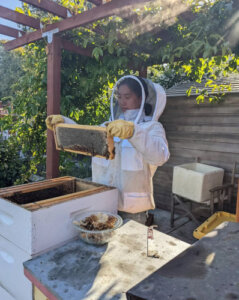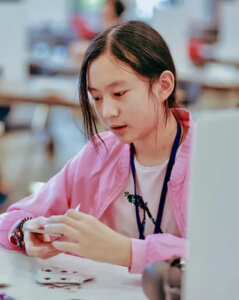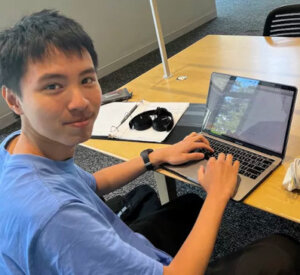The Fellows Scholarship awards $50,000, $25,000 and $10,000 scholarships to extraordinary young people, 18 and under, who have completed a significant piece of work. Application categories are Science, Technology, Engineering, Mathematics, Literature, Music, Philosophy and Outside the Box.
The class of 2023 Fellows includes many who developed research that have the potential to better the health of others. A few of these projects are highlighted below.
 Renee Wang received a $25,000 scholarship for developing a a tiny home prototype designed to help the unhoused live off the streets with independence and dignity. Unlike any other prefabricated homes currently available in the market, its innovative modular concept makes manufacturing, transportation, and installation cheaper, faster, and more efficient. The project’s engagement with the unhoused community not only yields valuable data but fosters empathy among individuals facing homelessness.
Renee Wang received a $25,000 scholarship for developing a a tiny home prototype designed to help the unhoused live off the streets with independence and dignity. Unlike any other prefabricated homes currently available in the market, its innovative modular concept makes manufacturing, transportation, and installation cheaper, faster, and more efficient. The project’s engagement with the unhoused community not only yields valuable data but fosters empathy among individuals facing homelessness.
Read more about Renee’s project >
 Anna Yang received a $10,000 scholarship for developing a system that addresses the global decline in bee populations, focusing on the widespread issue of queen failure. Leveraging machine learning and IoT technology, the initiative aims to create an algorithm that helps beekeepers monitor queen presence without requiring specialized listening skills. This work serves as a foundational step toward a comprehensive solution for queen failure in beekeeping, with the potential to benefit beekeepers globally.
Anna Yang received a $10,000 scholarship for developing a system that addresses the global decline in bee populations, focusing on the widespread issue of queen failure. Leveraging machine learning and IoT technology, the initiative aims to create an algorithm that helps beekeepers monitor queen presence without requiring specialized listening skills. This work serves as a foundational step toward a comprehensive solution for queen failure in beekeeping, with the potential to benefit beekeepers globally.
Read more about Anna’s project >
 Claire Wang (pictured, right) and Michael Huang (pictured, below) received a $25,000 scholarship for developing a fast data mining algorithm that discovers densely connected communities within networks. These networks can represent social media communities, disease genetics connections, protein-protein interactions, political connections, and more. The algorithm is more efficient than existing data mining solutions and has applications in detecting fraud and bots in social networks, enhancing content recommendation algorithms, and uncovering communities in various graphs.
Claire Wang (pictured, right) and Michael Huang (pictured, below) received a $25,000 scholarship for developing a fast data mining algorithm that discovers densely connected communities within networks. These networks can represent social media communities, disease genetics connections, protein-protein interactions, political connections, and more. The algorithm is more efficient than existing data mining solutions and has applications in detecting fraud and bots in social networks, enhancing content recommendation algorithms, and uncovering communities in various graphs.
 Beyond specific applications, the project contributes to parallel computing research, addressing the modern need for algorithms with high parallelism to leverage increasing CPU cores. The optimization methods used have broad applications, making it a valuable tool for processing large datasets across various fields.
Beyond specific applications, the project contributes to parallel computing research, addressing the modern need for algorithms with high parallelism to leverage increasing CPU cores. The optimization methods used have broad applications, making it a valuable tool for processing large datasets across various fields.
Read more about Claire & Michael’s project >
See also the Current and Past Fellows page for more Fellows spotlight features.
Comments